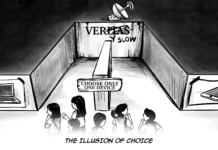THERE IS strength in numbers. But to the chambers of Philippine Congress, it is a detriment.
It is always a game of numbers in politics: the votes of our representatives—the Ayes and Nays—are crucial in passing laws aimed at making the lives of Filipinos better.
But do district and partylist congressmen still vote on the passage of laws based on the voice of their constituents and their own conscience?
Our Constitution enshrines that the three branches of government are co-equal, tasked with different duties but with a single, unifying mandate: to serve the people.
But it seems that lawmakers vote based on their personal interests and those of their respective political parties these days, completely disregarding what their constituents have to say on legislative matters.
Sad to say, the country’s legislative body has evolved, nay, turned into a rubber stamp congress that serve at the pleasure of whoever is sitting in Malacañang.
This has been proven many times not only under the administration of President Rodrigo Duterte, but also of the previous administrations.
For instance, on Sept. 12, the House of Representatives voted to give the Commission on Human Rights, the constitutional body embattled in the time of Duterte’s bloody drug war, a budget of P1,000 for next year.
Had this move not received public outcry and humiliation, they would not have decided to restore its budget back to the original P600 million it had proposed.
On March 7, Congress approved the third and final reading the passage of the bill restoring death penalty as capital punishment, with only drug-related offenses punishable.
Congress also railroaded the passage of the controversial Reproductive Health Law on Dec. 17, 2012, dominated by then ruling Liberal Party of former president Benigno Aquino III.
These instances, and surely there are more, propagate the culture of seeing our lawmakers as highly, powerful and unreachable people when it is us who elect them to power.
It makes constituents forget to clamor, complain, or even demand for a dialogue with their representative. Lawmakers take it upon themselves to decide on what would be beneficial only for them, hiding their motives under the cloak of what would be good for their districts.
The lack of awareness from the electorate worsens the present scenario. It maintains and prolongs our failure to demand accountability from our public officials.
The tides have turned these days with some lawmakers from both Congress and the Senate rubbing it to our face that they are serving us as if we should even look at them with a sense of gratitude or “utang na loob” when it is them who wanted to serve us in the first place.
The Filipino people can halt this shameful culture and bring about the real coming of change by holding our public officials accountable to break the chains of a rubber stamp legislature.

















Talaga? If indeed Congress serves at the pleasure of the President, why for heaven sake, the land use act (to conserve our natural resources) emergency powers of the president (to solve traffic congestion), anti red tape bill and rightsizing bill (to simplify the bureaucracy and to fasten delivery of public services), all certified as urgent by the president, are still pending in Congress?
And why are your public officials not accountable to the people? Have you ever asked why? Have you even considered the structure of the govt and the 1987 consti as the main reason why this set up is not working for us.